Improving Customer Service with Field Service Lightning
Salesforce
5 MIN READ
July 17, 2024
![]()
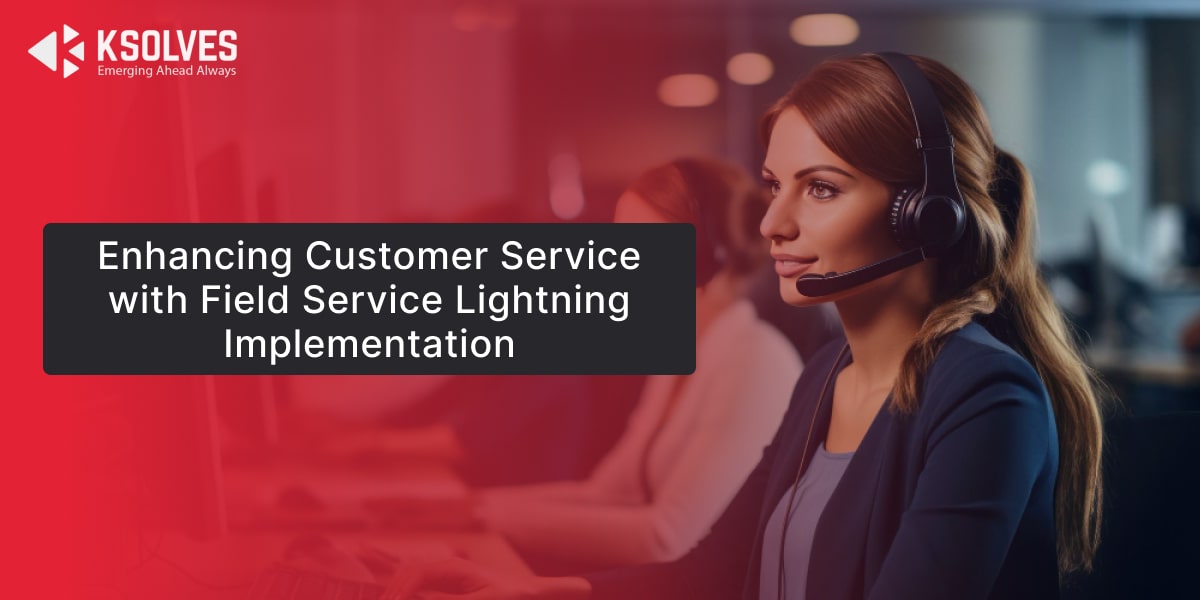
In today’s competitive business landscape, delivering phenomenal customer service is important for building brand loyalty and compelling business growth. Hence it has become imperative for enterprises to let go of conventional practices and accept innovative ways of encouraging their brand awareness, handling operations, and increasing their conversion rate.
Field Service Lightning (FSL) has become one of the ideal solutions for managing field services. FSL is a unified platform for controlling and managing all field operations. Whether you install, fix, or maintain solar panels, automobiles, TVs, air conditioners, or any other type of item, enterprises are supposed to deliver top-notch services to their customers. And to help them with it, FSL, a salesforce product enables companies to manage field operations effectively and efficiently.
It is inevitable to require a strong field service management system to simplify and stabilize the administration of clients and field representatives. To cater to this crucial need, Salesforce brought Field Service Lightning into the picture. And how this tool simplifies everything from receiving a request of service to post-service support.
Overview of Field Service Lightning
Field Service Lighting (FSL) is a software that is known for providing cognitive workforce management solutions in order to produce optimal user experiences. FSL is a single platform that controls and manages all the field operations and keeps all the concerned parties in the loop.
One of the indigenous advantages of Salesforce CRM is the 360-degree examination of customer information. These days, plans are created based on the data gathered, and information is routinely tracked. The information can be swiftly transmitted to the field service crew via Field Service Lightning. Salesforce’s Field Service learning map is a helpful tool for assisting you on the road to Field Service success.
Why Choose Field Service Lightning Services
Catering to the needs of customers and providing them with top-notch services, comes with a majority of challenges. These challenges call for the need to have an intuitive platform that is not only responsible for solving the problems but also providing permanent solutions to them.
Let’s have a look at some of the challenges in Field Service Management.
1. Tasks like installations and repairs were handled manually through spreadsheets and calls. This often questioned the scalability and efficiency.
2. Managing the real-time tracking of field technicians has proven challenging, with restricted visibility and control over productivity and activities adding complexity to the process.
3. The fragmentation of data across multiple systems results in substantial efficiency losses, particularly for service managers who oversee work orders, inventory management, technician schedules, and escalations.
4. The lack of organization in data and dependence on laborious paperwork impede the capacity to derive actionable insights from field service operations.
5. Technicians completing documents and forms after each field visit to generate service reports are susceptible to errors and frequently omit crucial information.
Salesforce Field Service Features
With the assistance of Salesforce FSL, businesses can access various features and functionalities that help to enhance service delivery and boost customer experience.
FSL, as a cloud platform, offers an unparalleled solution encompassing all aspects of field service management, including scheduling, dispatching, tracking, and reporting. Additionally, it provides mobile accessibility to product data, service request specifics, and customer information.
Furthermore, FSL facilitates integration with other Salesforce products such as Salesforce Service Cloud, Sales Cloud, and IoT Cloud, ensuring seamless delivery of customer services across various devices and channels.
Let’s look at some features that help businesses optimize workforce efficiency with field service lightning:
1. Management of Work Orders:
Field service lightning helps streamline the field service process by utilizing it to create and manage work orders. This functionality can be linked with invoicing for a simplified payment procedure after the work order is finalized. It will be simple to view accounts and confirm the job requirements and prerequisites.
2. Scheduling the Resources
With an intuitive scheduling system, Field technicians can be assigned most effectively by firms depending on their availability, expertise, and proximity to service sites. To guarantee effective resource allocation, the intelligent scheduling system considers a number of variables, including technician capabilities, location, workload, and SLAs (Service Level Agreements).
3. Mobile Accessibility
FSL provides you with mobile accessibility wherein, with just a few clicks, an FSL dispatch console will assist you in visualizing your workforce. With the use of this function, you can arrange appointments to best suit the technicians’ availability and skill levels.
Each search can be tailored to include parameters that best fit the needs of the task at hand. Establishing the project timetable won’t ever take up work hours.
4. Inventory Management
With the Salesforce Field Service implementation, businesses have access to inventory management features. Enterprises can keep an eye on and manage their stock levels and service parts.
With real-time inventory updates, availability checks, and part requests, technicians can make sure they have everything they need to finish jobs quickly.
5. Real-Time Insights
FSL facilitates real-time updates and notifications to keep field technicians and back-office teams informed. This includes automatic notifications of schedule changes, work order updates, and alerts for urgent or high-priority tasks.
6. Integration with Other Salesforce Products
Field Service Lightning gives the advantage of integrating with third-party products like Sales Cloud and Service Cloud. This integration allows seamless data transfer across departments and a consolidated picture of client details, service history, and sales prospects is also provided.
Also read: https://www.ksolves.com/blog/salesforce/salesforce-field-service-lightning
Who Uses Salesforce Field Service
FSL is majorly utilized by companies that provide field services like structuring, maintenance, inspection, repair, delivery, etc., for their customers. It also includes companies providing facilities for management, inventory management, IT support, etc.
Irrespective of company size and domain, businesses utilize the capabilities of Field Service lighting to enhance efficiency and provide tailored and customized results to their customers.
According to research conducted in North America, 52% of organizations continue to employ manual methods for working and assigning field service tasks, while 48% have transitioned to utilizing Field Service Management software.
However, 38% of service technicians find it challenging to access all essential information. The study reveals that 72% of organizations prioritize enhancing customer experience through the effective utilization of field service management software.
Below are some of the industries that are using FSL:
1. Healthcare
Healthcare industries have been facilitated by Field Service lighting by improving home visits, reducing the unavailability of information, and strengthening communications for all parties involved.
Healthcare organizations can provide dependable and effective services to individuals who are unable to access medical facilities by means of FSL. With mobile devices, they can now track health status, schedule, and dispatch medical workers and equipment, and view service history.
2. Finance
Financial Advisor helps financial organizations provide professional, individualized customer care. By streamlining face-to-face interactions, Field Service Lightning (FSL) guarantees professional advice for astute and knowledgeable financial decisions.
Various companies utilize FSL’s comprehensive functionalities to arrange one-to-one meetings with qualified experts. Additionally, it provides access to customer information and product data which further boosts the conversion rate, increases customer satisfaction, and enhances brand awareness.
3. Manufacturing and Automobiles
Manufacturing and automotive companies have streamlined their operations with the help of FSL. The platforms help in optimizing maintenance and repairs, providing real-time visibility, empowering mobile workforces, enabling maintenance, and enhancing customer experience.
Manufacturers can efficiently schedule and dispatch technicians for prompt equipment maintenance, reducing downtime and optimizing production uptime. Additionally, by delivering proactive service and personalized experiences, FSL helps to build loyalty and drive business growth in today’s competitive market.
4. Retail
Field Service Lightning (FSL) revolutionizes the retail industry by enhancing customer experiences and operational efficiency. Through real-time tracking of service requests and technician assignments, FSL optimizes scheduling, reducing wait times for customers. Its mobile capabilities empower technicians with comprehensive customer data and troubleshooting tools, enabling faster issue resolution on-site.
Additionally, FSL enables foresighted maintenance, controlling downtime, and ensuring seamless procedures. Integration with sales and inventory systems simplifies operations, fostering retailers to offer personalized assistance and upsell opportunities. Eventually, FSL transforms the retail landscape by enabling customer satisfaction, minimizing disruptions, and maximizing revenue potential through efficient field service management.
5. Telecommunication
By streamlining field operations, Field Service Lightning (FSL) transforms the telecom sector. It enhances service delivery and comeback times by allowing real-time technician scheduling, dispatching, and tracking. The mobile capabilities of FSL enable technicians to access vital information while on the go, enhancing productivity and first-time fix rates. It reduces travel time and increases productivity with clever resource allocation and routing.
By utilizing integrated inventory management, FSL minimizes downtime by guaranteeing the accessibility of appropriate tools and parts. Furthermore, preventive supervision and customer-focused help are made possible by its analytics, offering insights into performance data. All things considered, FSL gives telecom businesses the ability to provide smooth, reliable, and convenient services, increasing client happiness and loyalty.
Steps to Implement Salesforce Field Service Lightning
1. To activate Field Service, follow these steps:
Go to Setup and type Field Service Settings in the Quick Find box. Then click on Field Service Settings.
2. Install the Field Service Managed Package
This package gives you access to the dispatcher console, scheduling tools, various custom objects, and Guided Setup.
Click on this link https://fsl.secure.force.com/install
Click on Install for Admins Only and then click Install.
Now, when you go to the app launcher, you can see the two apps.
The Field Service Admin app lets admins customize the package, schedule, and optimization, and operate the dispatcher console.
With the Field Service app, dispatchers can easily see and manage a flawless service schedule.
The Field Service Lightning (FSL) application encompasses essential objects to streamline operations in the telecommunications industry:
- Work Order: Centralizes service request information, including customer details, service location, type, assigned technician, and related data.
- Technician: Represents field service personnel, containing contact information, availability, and skill sets for efficient assignment.
- Asset: Manages equipment or assets requiring repair, maintenance, or service, including serial numbers, warranty details, and maintenance history.
- Inventory: Tracks spare parts and inventory necessary for service completion, detailing item descriptions, quantities, and locations.
- Service Agreement: Captures contractual details between customers and the service provider, encompassing SLAs, contract terms, and billing information.
- Schedule: Organizes service work timelines, including dates, assigned technicians, and additional relevant information for effective planning and execution.
These interconnected objects facilitate seamless coordination and execution of service requests, enhancing operational efficiency and customer satisfaction in the telecommunications sector.
Benefits of using Field Service Lightning
1. Seamless tracking of Field Service
Accounts, assets, cases, contracts, entitlements, and service contracts are all covered by integrated work orders made possible by FSL. This aids in the systematic creation and completion of work orders for several businesses, including cable service providers and producers of solar panels. By tracking fieldwork seamlessly, FSL guarantees efficient service operations.
2. Preventive Maintenance of Assets
By employing the Advanced Assets functionality, FSL finds parts of assets that require repair before they malfunction. The feature that displays products with many pieces in one view and aids in tracking consumer products is called asset hierarchy. Customers are satisfied with the faster and higher-quality services provided by this preventive maintenance strategy.
3. Hassle-free Scheduling and Dispatch
The Lightning Console from FSL makes it simple to schedule service appointments and assigns mobile resources automatically according to factors like location, time, and skill set. When faced with critical circumstances, such as crises in solar-powered enterprises, FSL facilitates prompt problem-solving by immediately dispatching the nearest field engineer.
4. Efficient Mobile Management System
Salesforce Field Lightning’s Dispatcher Console authorizes managers to handle mobile operations, handle alerts quickly, easily schedule bulk jobs, and scrutinize mobile resources in real time. This efficient mobile management system ensures timely actions and enhances overall field service performance.
Real-world examples of Field Service Cloud Implementation
Case 1: Agents, customers, and suppliers of goods and inventory are in a game of tick-tack-toe.
This illustration relates to a company that delivers full glass substitute and repair services to the commercial, automobile, and residential markets. They offer services that are timely and affordably offered, and they cater to the demands of company owners, homeowners, and car owners.
Challenges:
Due to the frequent complaints over the quality of the services provided, one of the company’s challenges was efficiently monitoring the performance of their field agents when they were interacting with consumers on-site.
It was also difficult to allocate and find appropriate agents manually from their database in order to immediately respond to service calls. A system to manage assets was desperately needed to make sure agents always had the tools they needed to satisfy customers.
Repetitive booking requests resulted from issues with matching the best agent to each assignment and scheduling appointments that balanced agent availability with customer preferences.
Solutions Offered:
By creating work orders for service agents and keeping track of their field operations, work order management was implemented, resulting in an efficient workflow that integrated with several systems, including contacts, accounts, and service contracts.
Booking appointments was made easier by using Field Service Lightning’s dispatch and scheduling tool, which automatically assigned qualified agents based on criteria including location, time, and skill set.
The inventory management feature improved asset management by making it possible to identify items that needed to be repaired and by giving clients an organized view of their products through an asset hierarchy.
Additionally, the Dispatcher console improved client management and scheduling by automating the distribution of service appointments among agents and enabling real-time tracking and monitoring of agent actions.
Results
- There was a significant decrease of 80% in Service request response time.
- Agents were 75% more likely to be efficient.
- The rate of customer satisfaction was enhanced by 70%.
Case 2: Retail Service Operations For Work Order Management
Our customer was employed in the retail sector. In order to record the information about the products purchased, they wish to schedule work orders and service appointments. They also want to provide technicians with a mobile app that allows them to use the FSL mobile app to install the products they have purchased at customers’ houses by utilizing built-in FSL features.
Challenges
The company encountered difficulties with appointment slot scheduling and dispatching, leading to inefficiencies in managing service appointments. Additionally, they struggled with service reports and documentation, hindering effective communication and record-keeping. Managing product requests and navigating the return process posed further challenges, impacting the smooth flow of inventory and customer satisfaction.
Solutions Offered:
We’ve delivered a comprehensive solution tailored for the retail industry, leveraging Salesforce’s Field Service Lightning (FSL) package and FSL mobile flow. Our approach included configuring a partner community and providing technicians with a streamlined login experience, granting them access to all necessary features within a unified interface.
To streamline work order management, we harnessed the capabilities of the FSL package, enabling functionalities such as work orders, service appointments, work types, operating hours, skills, and order products directly within Salesforce.
To enhance the mobile experience, we integrated Lightning Web Components (LWC) components into the Mobile App, as Field Service Mobile Flow doesn’t inherently support LWC. This ensured a seamless user experience for technicians while accessing key functionalities on the go.
Additionally, we developed Rest API classes to facilitate third-party user access to the Salesforce database, enabling them to update records based on purchased product quantities. This integration fosters interoperability and enhances data accessibility across platforms, contributing to a more efficient and collaborative ecosystem.
Results
- Effective automation and coordinated work order administration with service appointments.
- Customers have enhanced service experience, thanks to this comprehensive solution.
- Innovation and quality have resulted in a more efficient and quick service procedure.
Also read: https://www.ksolves.com/insights/case-study-revolutionize-retail-service-operations#overview
Case 3: Inadequate and Erroneous Service Operations
This case is about a company, that is known to be renowned for providing the best services in enterprise video communication. They offer users a platform that is easy to use and is equally reliable for video and audio conferencing, collaboration, chat, and webinars on different devices and systems.
Challenges:
The dispatching team used Google Calendar to set up appointments, but they ran into problems with authorization and visibility, which made the process time-consuming. This ineffective approach frequently resulted in overscheduling or underusing of available resources.
Furthermore, teams were forced to use MS Excel in the absence of a formal checklist for the installation team due to a lack of a complete system to track installation details, which made it impossible for other teams to access on-site data.
Additionally, the management team spent five to six hours a week on weekly reporting, wasting a great deal of time and resources in the process.
Solutions Offered
To cater to the challenges, FSL offered solutions for better outcomes.
The Gantt chart function of Field Service Lightning was used to schedule resources effectively, enabling dispatchers to assign resources quickly and precisely while avoiding double booking. Appointment scheduling procedures were eventually improved by this innovation, which offered a transparent view of project statuses.
Salesforce’s Milestone PM+ feature enabled thorough planning from start to finish for installation projects, giving project managers the ability to effectively manage checklists, keep track of appointments, and document tasks that need to be done on-site.
In order to monitor and enhance team performance, real-time data completion on-site provided dispatchers with instant visibility into projects and allowed management to receive real-time reports.
Results
- About 60% of the data was accurately delivered.
- Reporting was decreased by 85%
- Scheduling time was also decreased by 80%
Field Service Lightning Licenses
Field Service Lightning provides a range of license options to accommodate diverse user roles and requirements within an enterprise. The following are a few typical license categories:
- Field Service User License: This license is intended for supervisors, technicians, and dispatchers who require complete access to Field Service Lightning capabilities and functions.
- Field Service Dispatcher License: This license gives access to dispatch console features and is intended for users who are in charge of setting up and dispatching field service appointments.
- Field Service Technician License: This license can be given to technicians who work in the field primarily and complete responsibilities like updating job statuses and filling out work orders.
- Field Service Platform License: This license is appropriate for users who might not need full access to all functionalities but still need access to specific bespoke apps or integrations developed on the Field Service Lightning platform.
- Field Service Mobile License: This license gives users access to mobile-specific features and functions and is designed for those who use Field Service Lightning primarily through the mobile app.
- Field Service Community User License: This license can be granted to users who require access to a community portal in order to communicate with field service teams or for self-service purposes.
To choose the best licensing types for each person, it is essential to consider the individual responsibilities and needs of your company. Also, Salesforce might have several pricing and packaging choices for these licenses, therefore, it is recommended to take guidance from a Salesforce specialist to know which option best suits your requirements.
Final Thought
Field Service Lightning can help in workforce optimization and captivate your customers with real-time updates and efficient solutions. It is a one-stop solution that incorporates seamlessly with Salesforce and eliminates the need for third-party software. Whether you need to manage work orders, scheduling, inventory, communication, or anything related to field service, Field Service Lightning can handle it all.
To know how Field Service Lightning can transform your customer field services and get unexpected results, you can get assistance from Ksolves. Take benefit of this opportunity to improve your business and customer satisfaction with Field Service Lightning.
Ksolves is the top Salesforce development business in the world, offering services that are 100% effective. Because of our dedication to meeting each client’s specific demands and our proficiency with the Salesforce platform, we have earned the designation of Salesforce Silver Partner.
![]()
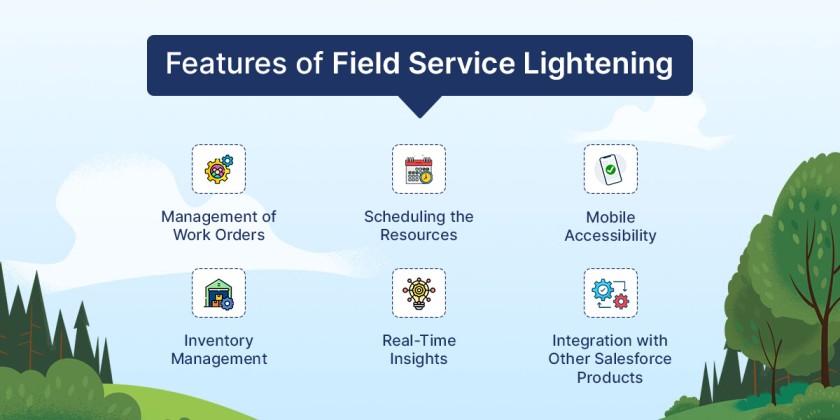
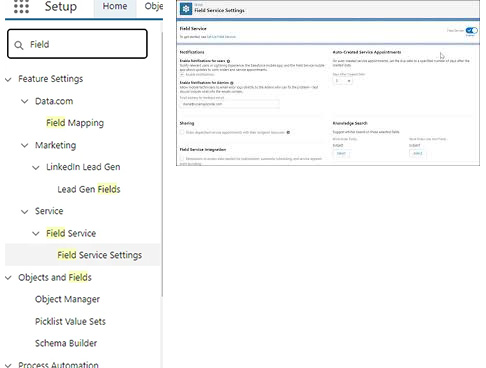

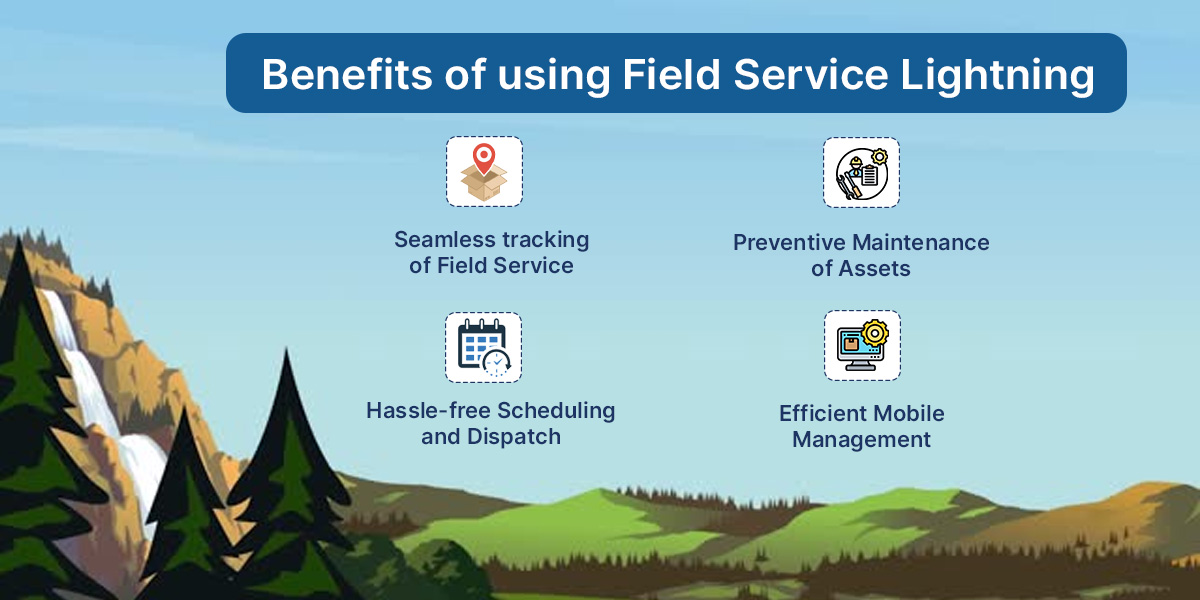
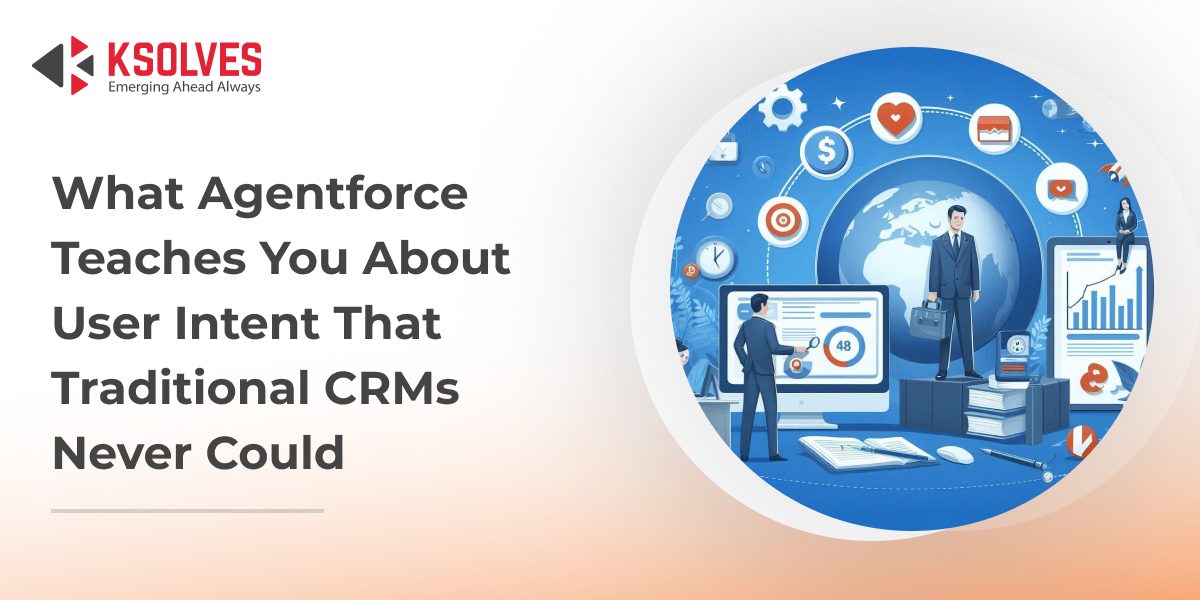
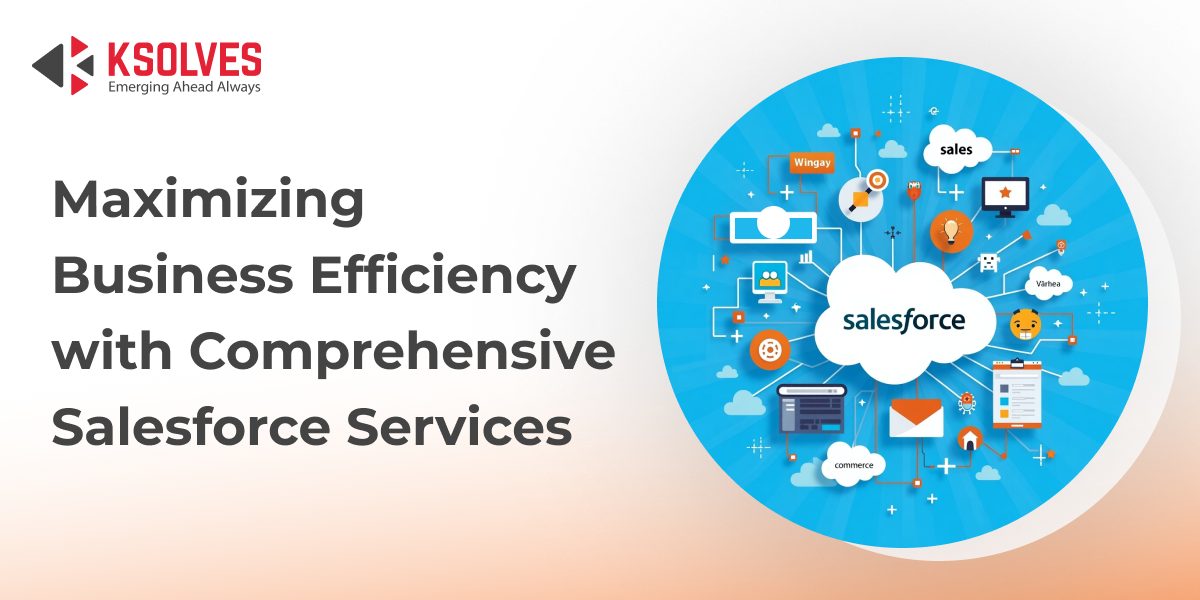
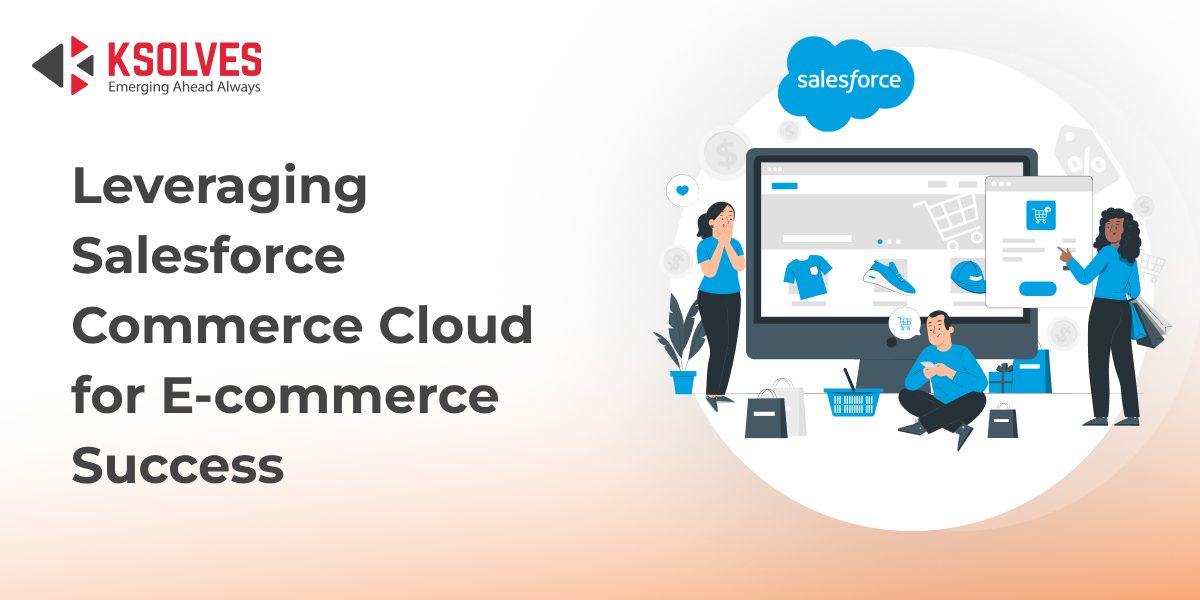

AUTHOR
Salesforce
Md. Asad Khan, an expert Technical Project Manager at Ksolves, who is a certified Salesforce architect at Ksolves, brings 7+ years of experience. He specializes in FSL, B2B, Service & Sales Cloud, and Non-profit cloud, excelling in APEX, Aura Component Framework, Lightning Components, Triggers, Visualforce, and creating insightful dashboards and reports.
Share with